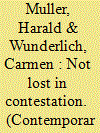|
|
|
Sort Order |
|
|
|
Items / Page
|
|
|
|
|
|
|
| Srl | Item |
| 1 |
ID:
158673


|
|
|
|
|
| Summary/Abstract |
With near universal membership, the nuclear nonproliferation regime can be considered a success of global nuclear governance. While it has proven robust since the Nonproliferation Treaty entered into force in 1970, the regime has faced continuous contestation, precisely because it is a delicate compromise between the nuclear and non-nuclear weapon states. In this article, we analyze the patterns of contestation within the regime as well as the actors driving these contestation processes. Our purpose is to assess how contestation has affected the development of nuclear norms. We show that contestation can lead to normative progress, result in blockage, or even lead to decay. We argue that the outcome depends on three factors: commitment by the powerful parties to appreciate the positions of the non-nuclear weapon states, the engagement of bridge-builders to shape compromises, and the construction of reciprocal gains for and compliance by all parties.
|
|
|
|
|
|
|
|
|
|
|
|
|
|
|
|
| 2 |
ID:
172901


|
|
|
|
|
| Summary/Abstract |
The 2017 Treaty on the Prohibition of Nuclear Weapons (tpnw) represents a daring act of self-empowerment: nuclear have-nots produced an international disarmament treaty without the involvement of the nuclear-weapon states or their allies. In this essay, we assess how the new treaty relates to the existing nuclear order and its four central norms: constraints on use, political restraint, non-proliferation, and disarmament. We discuss the tpnw's origin in and impact on this contested order. At the heart of contestation are two security concepts: deterrence versus the immediate ban of nuclear arms, which result in fundamentally different ideas on how to pursue the road to “global zero.” Whether or not the tpnw and the Treaty on the Non-Proliferation of Nuclear Weapons are compatible depends on how the opponents handle their controversies. The key is to overcome the emotionalized polarization and rediscover a common basis in order to prevent damage to the existing nuclear order and bring forward nuclear disarmament in practice.
|
|
|
|
|
|
|
|
|
|
|
|
|
|
|
|
| 3 |
ID:
185992


|
|
|
|
|
| Summary/Abstract |
The most inclusive security treaty in the world, the Treaty on the Non-Proliferation of Nuclear Weapons (NPT) turned 50 in 2020. Our special issue takes stock of the NPT’s vitality after these five decades. In this introduction, we emphasize the need to distinguish between the treaty instrument and the larger nuclear nonproliferation regime. Next, we consider a recent development that may represent a serious impending shock which could weaken the NPT: dramatic changes in the treaty’s legal and normative landscape. Then, we assess vitality of the NPT in light of current concerns, arguing that norm contestation can be healthy for international regimes and calls for the death of the NPT are premature. Finally, we review the contributions of our special issue authors, highlighting the significant differences among them, and embedding them in ongoing research on the NPT.
|
|
|
|
|
|
|
|
|
|
|
|
|
|
|
|
| 4 |
ID:
072883


|
|
|
|
|
| Publication |
2005.
|
| Summary/Abstract |
The Biological Weapons Convention (BWC) regime currently suffers from a lack of effective compliance procedures. Because a legally binding compliance protocol to the BWC is not available, other measures are needed to stabilize the regime against the risk of violations of its rules. The Treaty on the Non-Proliferation of Nuclear Weapons, the Chemical Weapons Convention, and the experiences of UN inspection teams show that among the necessary components of effective compliance mechanisms are an intermediary level between bilateral consultations of states parties and involvement of the UN Security Council as well as independent assessment capabilities. This article suggests that the UN Secretary General could assume such an intermediary function and, using the authority contained in Article 99 of the UN Charter, could investigate not only alleged use of biological weapons but also alleged breaches of the BWC. A standing expert unit in the Department for Disarmament Affairs could provide the independent expertise necessary for such investigations. Such a compliance mechanism could provisionally help stabilize the BWC regime until a permanent compliance system can be agreed.
|
|
|
|
|
|
|
|
|
|
|
|
|
|
|
|
|
|
|
|
|